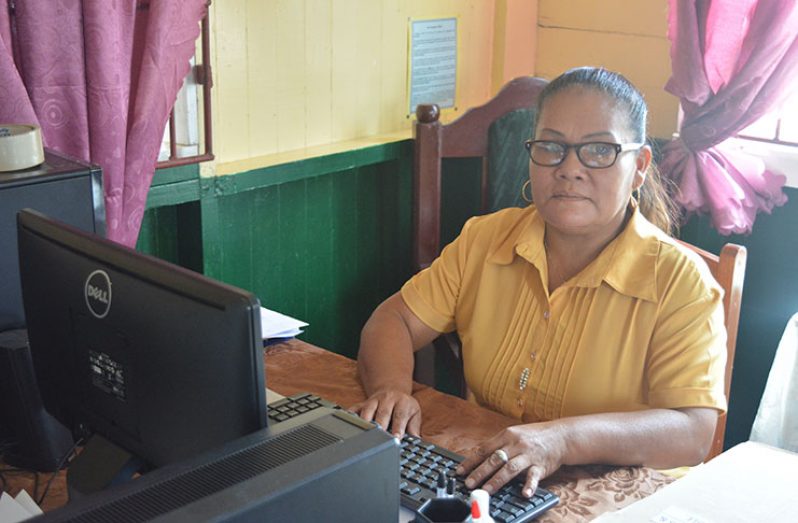WITH the domination of Hip-Hop, Rhyme and Blues, Soca and Dance Hall music on the airways, coupled with other factors, Tapakuma, an Indigenous settlement 14 miles aback the township of Anna Regina, is facing a cultural corrosion.“Hardly on the radios do you hear Amerindian songs, except during Heritage Month celebrations. Most of our young people tune in to radio for news, information and entertainment, and most of what they get, especially for entertainment, are not related to Indigenous culture,” Tapakuma Lake Primary School headteacher Karen Basdeo laments.
Basdeo, hailing from Wakapao, Pomeroon River, has been trying to revive Indigenous songs, dances and culture at her school. She said much work needs to be done, noting that the problem is not only at Tapakuma, but at other Indegenous communities as well.
According to the seasoned teacher, community elders are not trying to confine villagers to their culture, or to forcibly tell them which culture to choose, but are trying to preserve their customs and way of life.
Guyana is a multi-cultural society, and aside from the music on the airwaves, the diminishing of cultural norms in the village has also been attributed to villagers adopting the various cultures on the coastland.
“Our children attend schools on the coast, and there they encounter different cultures. Some of them adapt to their new culture, and in doing so, some lose appreciation for their customs and traditions,” Basdeo said.
With the Tapakuma Lake Primary School now having the services of a culture teacher, efforts are being made to establish cultural groups to preserve the songs, poems and dances of the Arawak people.
NO LONGER HAPPENS
Basdeo related that, years ago, villagers used to gather around a tree and sing their traditional songs and dance to them, and in this way they kept their culture alive; but today, this no longer happens.

“The young people can be seen sporting their smartphones and singing and dancing to the Hip-Hop and Soca tunes. Nothing is really wrong with this. It is good that they can (show) appreciation (for) a different culture; but in doing so, what we want is that they do not lose appreciation of their own,” she said.
To address this situation, community elders intend to host concerts, fairs and exhibitions to celebrate their Indigenous traditions, and this will be done in addition to Indigenous Heritage Month.
For Basdeo, preservation of the Indigenous culture should not centre only around a month of activities held once every year, but should be an everyday task for all persons of Indigenous descent.
“And all in our community have a role to play. The Government has been doing a lot to keep the cultures of the Indigenous peoples alive, and we Amerindians are very grateful for the efforts in that regard. We are happy that we have an entire month to celebrate our cultures and customs, but the Government should look at granting Amerindians a national holiday,” the head-teacher said.
The Government has designated May 5 as Arrival Day, an occasion to celebrate the arrival of all the ethnic groups which came to these shores.
NATIONAL HOLIDAY
As the first people of Guyana, and in recognition of their contribution to national development, Basdeo is of the view that a day in the Heritage Month celebration should be declared a national holiday in honour of Indigenous peoples.
Since Stephen Campbell, the first Indigenous person who became a Member of Parliament (MP) in 1957, several other persons of Indigenous extraction rose to occupy prominent public office. Among them are Carolyn Rodrigues, who served as Minister of Amerindian Affairs and Minister of Foreign Affairs; and Dr. Desrey Fox, who served as Minister of Education. Both served in the People’s Progressive Party Administration.
In the current Government, Fourth Vice President and Minister of Indigenous People’s Affairs, Sydney Allicock; Minister in the Ministry of Amerindian Affairs, Mrs. Valerie Garrido-Lowe; Health Minister Dr. George Norton; and Minister within the Ministry of Communities, Mrs. Dawn Hastings-Williams, are all of Indigenous extraction.
There are also other parliamentarians of Indigenous origin sitting on both sides of the House in this, the 11th Parliament of Guyana.
“So there is no question (in regard) to the contribution of Amerindians to the development of Guyana, and the dedication of a national holiday in their honour is not a case of us asking for too much,” Basdeo contended.
This, she said, can go a far way in inspiring the Indigenous peoples to greater appreciation of their rich culture and traditions, and thereby help in stemming the erosion of their culture.



.jpg)








